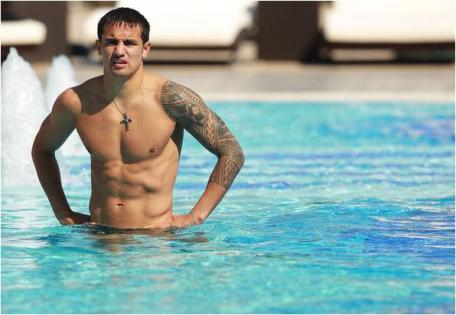Australia’s football team, the Socceroos, has the second biggest match it’s played in almost eight years tonight.
Not in terms of attendees – which is set to be a capacity at Sydney’s ANZ Stadium – but because of what’s at stake: a berth at the 2014 FIFA World Cup to be held in Brazil this time next year.
The only bigger match the Socceroos have played between November 2005, when we qualified for the 2006 tournament, and now was the Final of the Asian regional competition, the Asian Cup. On that occasion in January 2011 we lost to our biggest rival, Japan, in a thrilling and dramatic match in extra time.
But before you ask ‘hang on, didn’t we play at the World Cup in 2010?’ the difference between qualification for the 2010 World Cup and this time around – and why none of the matches were at the same level of hype - is that qualification was more or less in the bag by April 2009, with three qualifying games left to play.
Seasoned Socceroos fans caution that we shouldn't yet start reading the Brazil travel guides, booking our flights, checking out where we’ll stay, learning a few basics of the Portuguese language and putting our names in the ballots for tickets. There is the little matter of tonight’s opponent - Iraq.
It’s an enormous credit to the players of the Iraq national team that they’ve reached this third stage of qualification.
It’s worth thinking about the facilities and amenities the Iraqi players had to learn and play their sport, compared with most of the other nations they’ve met in this qualifying phase.
The oldest player in the Iraq squad is 28; we have 15 players in our squad who are older – and the eldest is 41 in October. It means that when the Iraq war started ten years ago, Iraq’s oldest player was 18 and his team-mates were all younger teenagers. Where did they train? Where did they play? What were the grounds like? What facilities did they have? What access to coaching did they have?
Iraq used to have a strong national competition when Australia had the national soccer league; and while the burgeoning A-League is growing in popularity ever year, Iraq hasn’t had a national league for several years, although some of their players feature in other national leagues. When Iraq has an international home game, it’s really an away game – played in a nearby Middle East nation. It is difficult for them to attract a coach for their national team, with the incumbent Serbian Vladimir Petrovic, only in the role since February this year.
Despite that, Iraq has produced some quality players. In 2004 – before the ravages of the Iraq war had an impact on the composition of the playing squad – they came 4th in the football tournament at the 2004 Athens Olympics. Their greatest achievement was three years later when they won the 2007 Asian Cup against the odds.
For Australia, the qualifying campaign has not been smooth either.
It was only two weeks ago, prior to a match against Japan, that many commentators and fans were wringing their hands at Australia’s chances of qualifying for Brazil. The popular view was that the team was too old, national coach Holger Osieck had no tactical flair, and there were no youngsters breaking down the door of taking over the mantle from the ‘golden generation’ who had made the 2006 World Cup.
But one night in Tokyo changed all that.
After a spirited and plucky draw against the Asian champions at home – which was almost a win – the proverbial tail of the Socceroos was up and, with two home games to play, qualification became a very strong possibility. After last week’s 4-0 thumping against Jordan in Melbourne, the ‘very strong possibility’ firmed into a ‘near certainty’ in the court of public opinion.
By comparison with Iraq, Australia can boast significant resources to contribute to the Socceroos qualifying campaign, the same coach who has been focussed only on this moment for three years and players who are still able to cut-it in international leagues as well as a booming domestic league.
With a home ground advantage and almost 88,000 passionate green and gold fans – now officially known as Terrace Australis - it’s not difficult to see why the anticipation and excitement over this ‘must win’ match amongst long term football fans, and even the marquee fans who turn up for the big events, is at fever pitch.
Australia should win in a canter. If it does, it will be one of four Asian nations participating in the greatest show on earth next year in Brazil. If it doesn't, there's another chance with a play-off against South America for one final spot.
The website www.australianfootballprss.com.au has been running a survey which, at time of publication of this story, has 80% of all respondents tipping an Australian win. We also asked some expert commentators for their view.
- Graham Arnold, Coach of Central Coast Mariners & former Socceroo: Australia, 3-0
- Francis Awaritefe, SBS football commentator & former Socceroo: Australia, 3-1
- Frank Farina, Coach of Sydney FC & former Socceroo: Australia, 3-0
- Ray Gatt, Football correspondent with The Australian newspaper: Australia, 4-0
- Robbie Slater, FOX Sports commentator & former Socceroo: Australia, 5-0
- Kimon Taliadoros, SBS football commentator & former Socceroo: Australia, 4-0
Players to watch:
- Australia: Mark Bresciano, Tim Cahill (pictured), Mile Jedinak, Robbie Kruse, Tommy Oar, Lucas Neill, Tom Rogic, Archie Thompson, Luke Wilkshire
- Iraq: Hawar Mulla Mohammed, Emad Mohammed, Bassim Abbas, Karrar Jassim, Ahmed Abid Ali, Samir Saeed
The match can be seen live on FOX Sports from 7.30pm, and on SBS-TV on a one-hour delay from 8.30pm. Broadcast times are earlier. The match is also live on ABC Radio and SBS Radio.



















__small.png)










